Evaluating Legal Frameworks & Ethical Dilemmas in UK Tourism
VerifiedAdded on 2023/02/02
|10
|3383
|63
Report
AI Summary
This report provides a detailed overview of the legal and ethical frameworks within the UK travel and tourism sector. It begins by explaining the legal and regulatory environment, including the roles of the Health and Safety Commission, IATA, and the Civil Aviation Authority. It then discusses surface, sea, and air transport laws concerning passenger carriage, highlighting key legislation like the Carriage of Passenger by Road Act 1974, Athens Convention 1974, and Warsaw Convention 1929. The report evaluates the impact of health, safety, and security legislation on UK tour operators, referencing the Health and Safety Act 1974 and the Occupier’s Liability Act 1984. It also analyzes equality legislation, such as the Sex Discrimination Act 1975, Employment Act 1978, Human Rights Act 1998, and Disability Discrimination Act 1995. Further, the report explains contracting and consumer protection legislation relevant to travel and tourism customers. Finally, it analyzes ethical dilemmas faced by the sector and examines Thomas Cook's Corporate Social Responsibility policy. The report aims to provide a comprehensive understanding of the legal and ethical considerations essential for the sustainable and responsible operation of travel and tourism businesses in the UK.
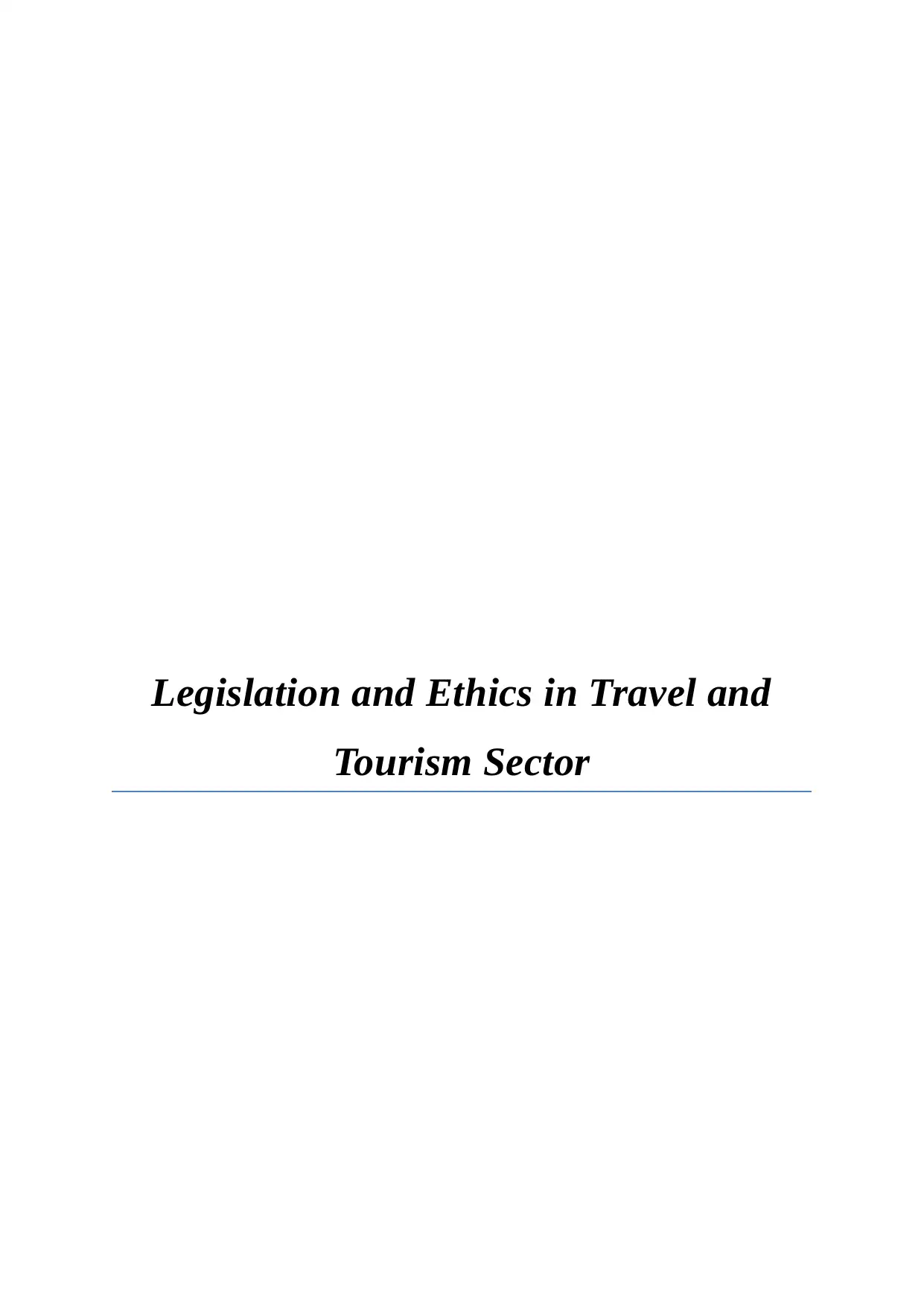
Legislation and Ethics in Travel and
Tourism Sector
Tourism Sector
Paraphrase This Document
Need a fresh take? Get an instant paraphrase of this document with our AI Paraphraser
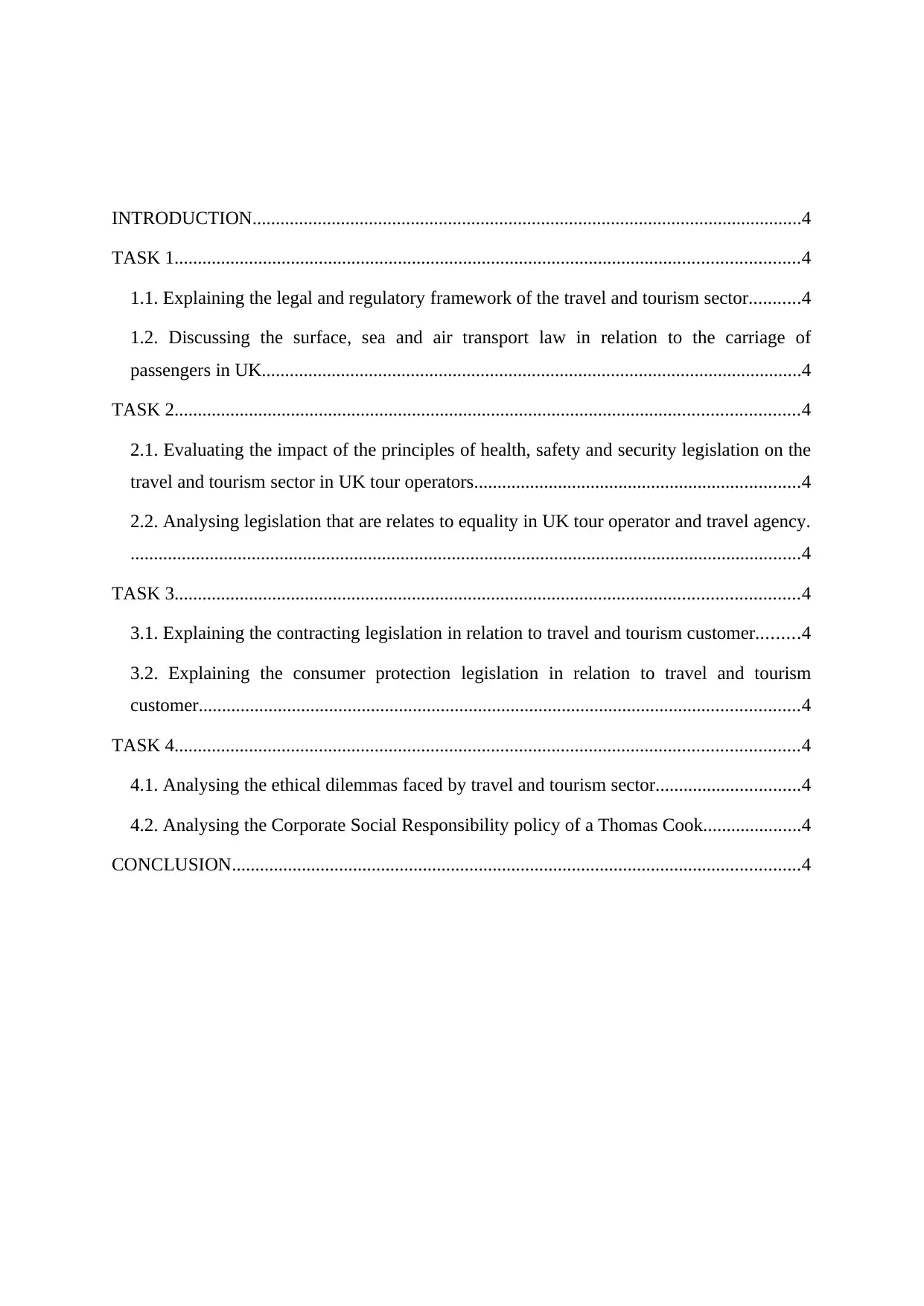
INTRODUCTION......................................................................................................................4
TASK 1......................................................................................................................................4
1.1. Explaining the legal and regulatory framework of the travel and tourism sector...........4
1.2. Discussing the surface, sea and air transport law in relation to the carriage of
passengers in UK....................................................................................................................4
TASK 2......................................................................................................................................4
2.1. Evaluating the impact of the principles of health, safety and security legislation on the
travel and tourism sector in UK tour operators......................................................................4
2.2. Analysing legislation that are relates to equality in UK tour operator and travel agency.
................................................................................................................................................4
TASK 3......................................................................................................................................4
3.1. Explaining the contracting legislation in relation to travel and tourism customer.........4
3.2. Explaining the consumer protection legislation in relation to travel and tourism
customer.................................................................................................................................4
TASK 4......................................................................................................................................4
4.1. Analysing the ethical dilemmas faced by travel and tourism sector...............................4
4.2. Analysing the Corporate Social Responsibility policy of a Thomas Cook.....................4
CONCLUSION..........................................................................................................................4
TASK 1......................................................................................................................................4
1.1. Explaining the legal and regulatory framework of the travel and tourism sector...........4
1.2. Discussing the surface, sea and air transport law in relation to the carriage of
passengers in UK....................................................................................................................4
TASK 2......................................................................................................................................4
2.1. Evaluating the impact of the principles of health, safety and security legislation on the
travel and tourism sector in UK tour operators......................................................................4
2.2. Analysing legislation that are relates to equality in UK tour operator and travel agency.
................................................................................................................................................4
TASK 3......................................................................................................................................4
3.1. Explaining the contracting legislation in relation to travel and tourism customer.........4
3.2. Explaining the consumer protection legislation in relation to travel and tourism
customer.................................................................................................................................4
TASK 4......................................................................................................................................4
4.1. Analysing the ethical dilemmas faced by travel and tourism sector...............................4
4.2. Analysing the Corporate Social Responsibility policy of a Thomas Cook.....................4
CONCLUSION..........................................................................................................................4
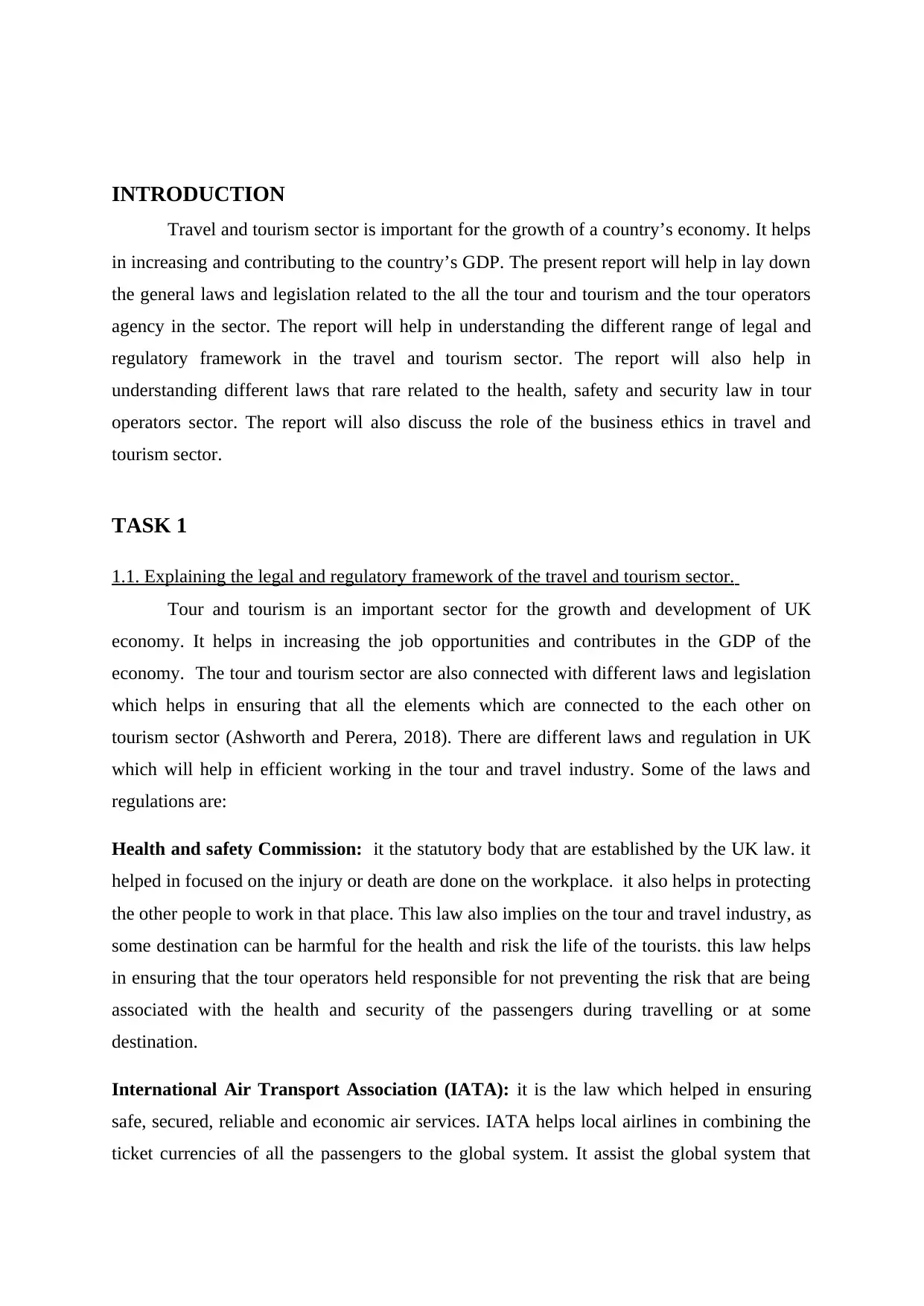
INTRODUCTION
Travel and tourism sector is important for the growth of a country’s economy. It helps
in increasing and contributing to the country’s GDP. The present report will help in lay down
the general laws and legislation related to the all the tour and tourism and the tour operators
agency in the sector. The report will help in understanding the different range of legal and
regulatory framework in the travel and tourism sector. The report will also help in
understanding different laws that rare related to the health, safety and security law in tour
operators sector. The report will also discuss the role of the business ethics in travel and
tourism sector.
TASK 1
1.1. Explaining the legal and regulatory framework of the travel and tourism sector.
Tour and tourism is an important sector for the growth and development of UK
economy. It helps in increasing the job opportunities and contributes in the GDP of the
economy. The tour and tourism sector are also connected with different laws and legislation
which helps in ensuring that all the elements which are connected to the each other on
tourism sector (Ashworth and Perera, 2018). There are different laws and regulation in UK
which will help in efficient working in the tour and travel industry. Some of the laws and
regulations are:
Health and safety Commission: it the statutory body that are established by the UK law. it
helped in focused on the injury or death are done on the workplace. it also helps in protecting
the other people to work in that place. This law also implies on the tour and travel industry, as
some destination can be harmful for the health and risk the life of the tourists. this law helps
in ensuring that the tour operators held responsible for not preventing the risk that are being
associated with the health and security of the passengers during travelling or at some
destination.
International Air Transport Association (IATA): it is the law which helped in ensuring
safe, secured, reliable and economic air services. IATA helps local airlines in combining the
ticket currencies of all the passengers to the global system. It assist the global system that
Travel and tourism sector is important for the growth of a country’s economy. It helps
in increasing and contributing to the country’s GDP. The present report will help in lay down
the general laws and legislation related to the all the tour and tourism and the tour operators
agency in the sector. The report will help in understanding the different range of legal and
regulatory framework in the travel and tourism sector. The report will also help in
understanding different laws that rare related to the health, safety and security law in tour
operators sector. The report will also discuss the role of the business ethics in travel and
tourism sector.
TASK 1
1.1. Explaining the legal and regulatory framework of the travel and tourism sector.
Tour and tourism is an important sector for the growth and development of UK
economy. It helps in increasing the job opportunities and contributes in the GDP of the
economy. The tour and tourism sector are also connected with different laws and legislation
which helps in ensuring that all the elements which are connected to the each other on
tourism sector (Ashworth and Perera, 2018). There are different laws and regulation in UK
which will help in efficient working in the tour and travel industry. Some of the laws and
regulations are:
Health and safety Commission: it the statutory body that are established by the UK law. it
helped in focused on the injury or death are done on the workplace. it also helps in protecting
the other people to work in that place. This law also implies on the tour and travel industry, as
some destination can be harmful for the health and risk the life of the tourists. this law helps
in ensuring that the tour operators held responsible for not preventing the risk that are being
associated with the health and security of the passengers during travelling or at some
destination.
International Air Transport Association (IATA): it is the law which helped in ensuring
safe, secured, reliable and economic air services. IATA helps local airlines in combining the
ticket currencies of all the passengers to the global system. It assist the global system that
⊘ This is a preview!⊘
Do you want full access?
Subscribe today to unlock all pages.

Trusted by 1+ million students worldwide
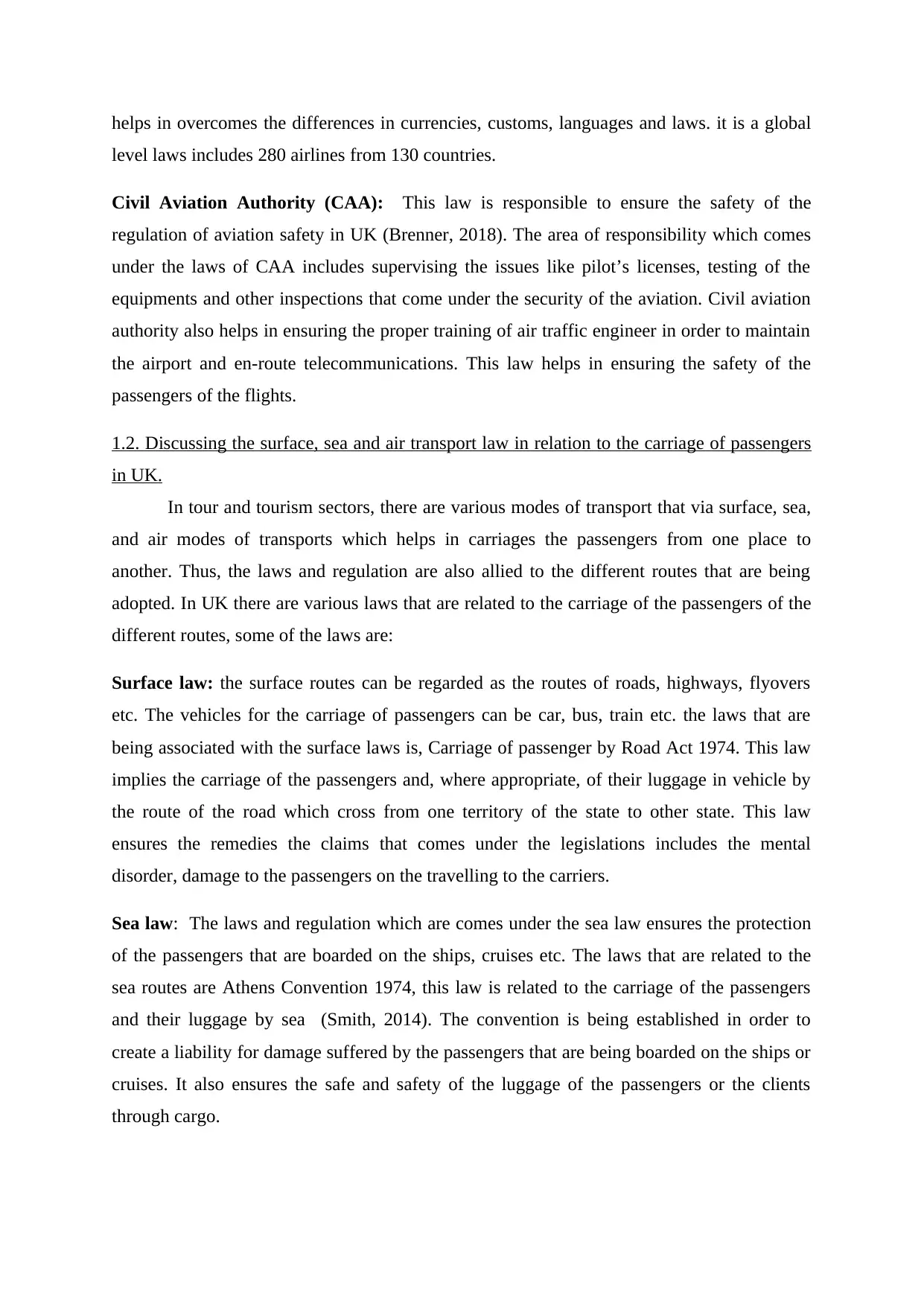
helps in overcomes the differences in currencies, customs, languages and laws. it is a global
level laws includes 280 airlines from 130 countries.
Civil Aviation Authority (CAA): This law is responsible to ensure the safety of the
regulation of aviation safety in UK (Brenner, 2018). The area of responsibility which comes
under the laws of CAA includes supervising the issues like pilot’s licenses, testing of the
equipments and other inspections that come under the security of the aviation. Civil aviation
authority also helps in ensuring the proper training of air traffic engineer in order to maintain
the airport and en-route telecommunications. This law helps in ensuring the safety of the
passengers of the flights.
1.2. Discussing the surface, sea and air transport law in relation to the carriage of passengers
in UK.
In tour and tourism sectors, there are various modes of transport that via surface, sea,
and air modes of transports which helps in carriages the passengers from one place to
another. Thus, the laws and regulation are also allied to the different routes that are being
adopted. In UK there are various laws that are related to the carriage of the passengers of the
different routes, some of the laws are:
Surface law: the surface routes can be regarded as the routes of roads, highways, flyovers
etc. The vehicles for the carriage of passengers can be car, bus, train etc. the laws that are
being associated with the surface laws is, Carriage of passenger by Road Act 1974. This law
implies the carriage of the passengers and, where appropriate, of their luggage in vehicle by
the route of the road which cross from one territory of the state to other state. This law
ensures the remedies the claims that comes under the legislations includes the mental
disorder, damage to the passengers on the travelling to the carriers.
Sea law: The laws and regulation which are comes under the sea law ensures the protection
of the passengers that are boarded on the ships, cruises etc. The laws that are related to the
sea routes are Athens Convention 1974, this law is related to the carriage of the passengers
and their luggage by sea (Smith, 2014). The convention is being established in order to
create a liability for damage suffered by the passengers that are being boarded on the ships or
cruises. It also ensures the safe and safety of the luggage of the passengers or the clients
through cargo.
level laws includes 280 airlines from 130 countries.
Civil Aviation Authority (CAA): This law is responsible to ensure the safety of the
regulation of aviation safety in UK (Brenner, 2018). The area of responsibility which comes
under the laws of CAA includes supervising the issues like pilot’s licenses, testing of the
equipments and other inspections that come under the security of the aviation. Civil aviation
authority also helps in ensuring the proper training of air traffic engineer in order to maintain
the airport and en-route telecommunications. This law helps in ensuring the safety of the
passengers of the flights.
1.2. Discussing the surface, sea and air transport law in relation to the carriage of passengers
in UK.
In tour and tourism sectors, there are various modes of transport that via surface, sea,
and air modes of transports which helps in carriages the passengers from one place to
another. Thus, the laws and regulation are also allied to the different routes that are being
adopted. In UK there are various laws that are related to the carriage of the passengers of the
different routes, some of the laws are:
Surface law: the surface routes can be regarded as the routes of roads, highways, flyovers
etc. The vehicles for the carriage of passengers can be car, bus, train etc. the laws that are
being associated with the surface laws is, Carriage of passenger by Road Act 1974. This law
implies the carriage of the passengers and, where appropriate, of their luggage in vehicle by
the route of the road which cross from one territory of the state to other state. This law
ensures the remedies the claims that comes under the legislations includes the mental
disorder, damage to the passengers on the travelling to the carriers.
Sea law: The laws and regulation which are comes under the sea law ensures the protection
of the passengers that are boarded on the ships, cruises etc. The laws that are related to the
sea routes are Athens Convention 1974, this law is related to the carriage of the passengers
and their luggage by sea (Smith, 2014). The convention is being established in order to
create a liability for damage suffered by the passengers that are being boarded on the ships or
cruises. It also ensures the safe and safety of the luggage of the passengers or the clients
through cargo.
Paraphrase This Document
Need a fresh take? Get an instant paraphrase of this document with our AI Paraphraser
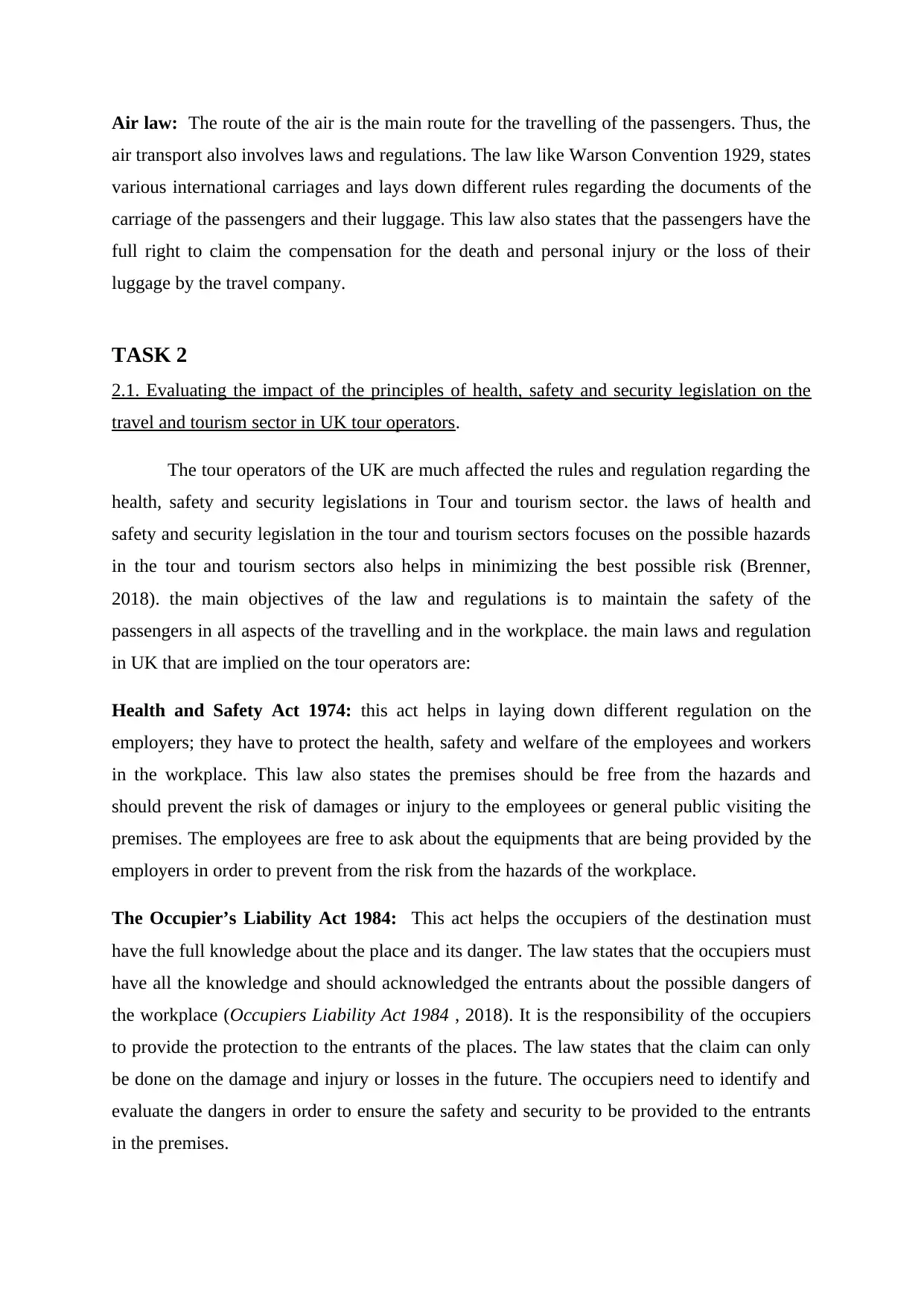
Air law: The route of the air is the main route for the travelling of the passengers. Thus, the
air transport also involves laws and regulations. The law like Warson Convention 1929, states
various international carriages and lays down different rules regarding the documents of the
carriage of the passengers and their luggage. This law also states that the passengers have the
full right to claim the compensation for the death and personal injury or the loss of their
luggage by the travel company.
TASK 2
2.1. Evaluating the impact of the principles of health, safety and security legislation on the
travel and tourism sector in UK tour operators.
The tour operators of the UK are much affected the rules and regulation regarding the
health, safety and security legislations in Tour and tourism sector. the laws of health and
safety and security legislation in the tour and tourism sectors focuses on the possible hazards
in the tour and tourism sectors also helps in minimizing the best possible risk (Brenner,
2018). the main objectives of the law and regulations is to maintain the safety of the
passengers in all aspects of the travelling and in the workplace. the main laws and regulation
in UK that are implied on the tour operators are:
Health and Safety Act 1974: this act helps in laying down different regulation on the
employers; they have to protect the health, safety and welfare of the employees and workers
in the workplace. This law also states the premises should be free from the hazards and
should prevent the risk of damages or injury to the employees or general public visiting the
premises. The employees are free to ask about the equipments that are being provided by the
employers in order to prevent from the risk from the hazards of the workplace.
The Occupier’s Liability Act 1984: This act helps the occupiers of the destination must
have the full knowledge about the place and its danger. The law states that the occupiers must
have all the knowledge and should acknowledged the entrants about the possible dangers of
the workplace (Occupiers Liability Act 1984 , 2018). It is the responsibility of the occupiers
to provide the protection to the entrants of the places. The law states that the claim can only
be done on the damage and injury or losses in the future. The occupiers need to identify and
evaluate the dangers in order to ensure the safety and security to be provided to the entrants
in the premises.
air transport also involves laws and regulations. The law like Warson Convention 1929, states
various international carriages and lays down different rules regarding the documents of the
carriage of the passengers and their luggage. This law also states that the passengers have the
full right to claim the compensation for the death and personal injury or the loss of their
luggage by the travel company.
TASK 2
2.1. Evaluating the impact of the principles of health, safety and security legislation on the
travel and tourism sector in UK tour operators.
The tour operators of the UK are much affected the rules and regulation regarding the
health, safety and security legislations in Tour and tourism sector. the laws of health and
safety and security legislation in the tour and tourism sectors focuses on the possible hazards
in the tour and tourism sectors also helps in minimizing the best possible risk (Brenner,
2018). the main objectives of the law and regulations is to maintain the safety of the
passengers in all aspects of the travelling and in the workplace. the main laws and regulation
in UK that are implied on the tour operators are:
Health and Safety Act 1974: this act helps in laying down different regulation on the
employers; they have to protect the health, safety and welfare of the employees and workers
in the workplace. This law also states the premises should be free from the hazards and
should prevent the risk of damages or injury to the employees or general public visiting the
premises. The employees are free to ask about the equipments that are being provided by the
employers in order to prevent from the risk from the hazards of the workplace.
The Occupier’s Liability Act 1984: This act helps the occupiers of the destination must
have the full knowledge about the place and its danger. The law states that the occupiers must
have all the knowledge and should acknowledged the entrants about the possible dangers of
the workplace (Occupiers Liability Act 1984 , 2018). It is the responsibility of the occupiers
to provide the protection to the entrants of the places. The law states that the claim can only
be done on the damage and injury or losses in the future. The occupiers need to identify and
evaluate the dangers in order to ensure the safety and security to be provided to the entrants
in the premises.
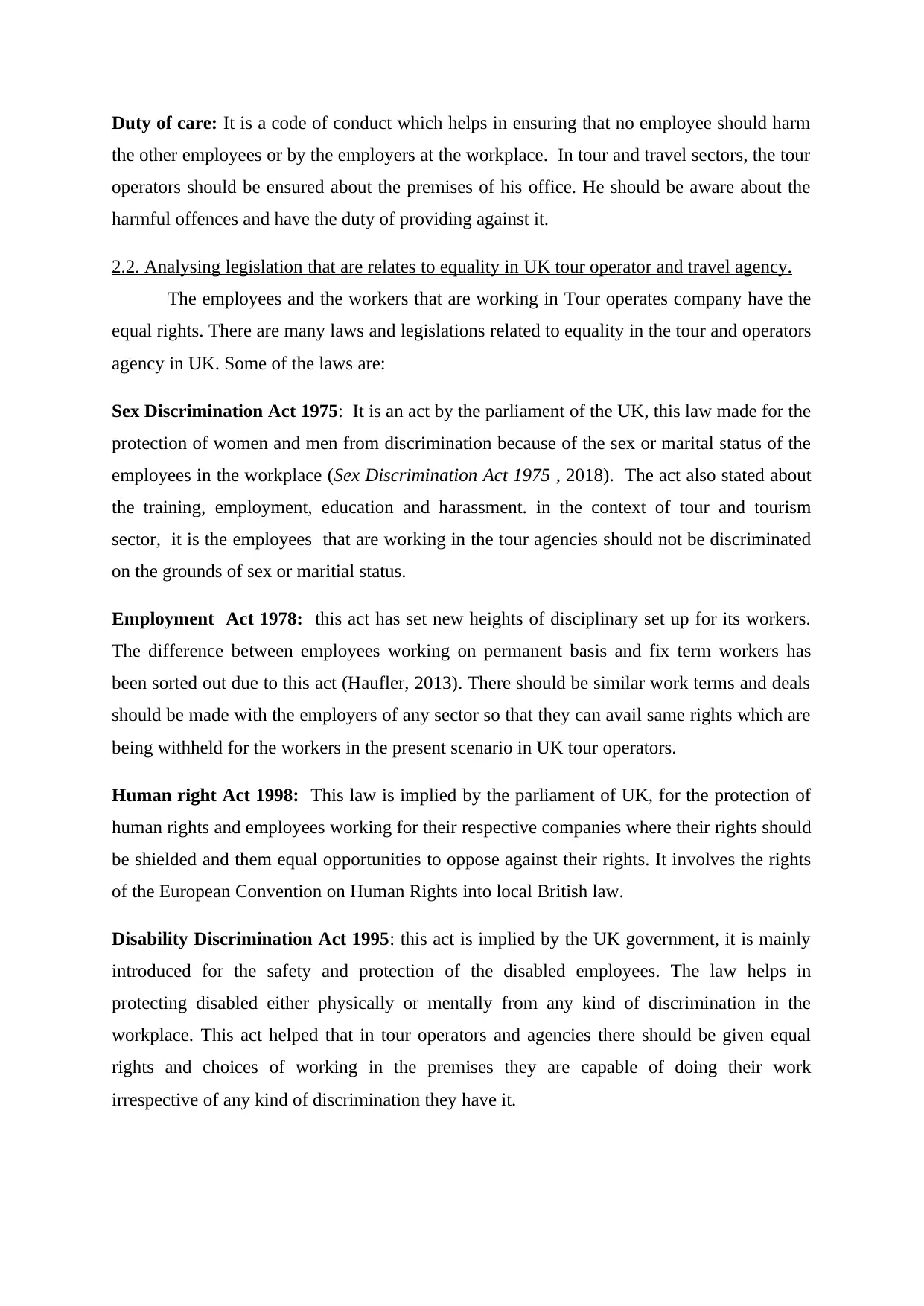
Duty of care: It is a code of conduct which helps in ensuring that no employee should harm
the other employees or by the employers at the workplace. In tour and travel sectors, the tour
operators should be ensured about the premises of his office. He should be aware about the
harmful offences and have the duty of providing against it.
2.2. Analysing legislation that are relates to equality in UK tour operator and travel agency.
The employees and the workers that are working in Tour operates company have the
equal rights. There are many laws and legislations related to equality in the tour and operators
agency in UK. Some of the laws are:
Sex Discrimination Act 1975: It is an act by the parliament of the UK, this law made for the
protection of women and men from discrimination because of the sex or marital status of the
employees in the workplace (Sex Discrimination Act 1975 , 2018). The act also stated about
the training, employment, education and harassment. in the context of tour and tourism
sector, it is the employees that are working in the tour agencies should not be discriminated
on the grounds of sex or maritial status.
Employment Act 1978: this act has set new heights of disciplinary set up for its workers.
The difference between employees working on permanent basis and fix term workers has
been sorted out due to this act (Haufler, 2013). There should be similar work terms and deals
should be made with the employers of any sector so that they can avail same rights which are
being withheld for the workers in the present scenario in UK tour operators.
Human right Act 1998: This law is implied by the parliament of UK, for the protection of
human rights and employees working for their respective companies where their rights should
be shielded and them equal opportunities to oppose against their rights. It involves the rights
of the European Convention on Human Rights into local British law.
Disability Discrimination Act 1995: this act is implied by the UK government, it is mainly
introduced for the safety and protection of the disabled employees. The law helps in
protecting disabled either physically or mentally from any kind of discrimination in the
workplace. This act helped that in tour operators and agencies there should be given equal
rights and choices of working in the premises they are capable of doing their work
irrespective of any kind of discrimination they have it.
the other employees or by the employers at the workplace. In tour and travel sectors, the tour
operators should be ensured about the premises of his office. He should be aware about the
harmful offences and have the duty of providing against it.
2.2. Analysing legislation that are relates to equality in UK tour operator and travel agency.
The employees and the workers that are working in Tour operates company have the
equal rights. There are many laws and legislations related to equality in the tour and operators
agency in UK. Some of the laws are:
Sex Discrimination Act 1975: It is an act by the parliament of the UK, this law made for the
protection of women and men from discrimination because of the sex or marital status of the
employees in the workplace (Sex Discrimination Act 1975 , 2018). The act also stated about
the training, employment, education and harassment. in the context of tour and tourism
sector, it is the employees that are working in the tour agencies should not be discriminated
on the grounds of sex or maritial status.
Employment Act 1978: this act has set new heights of disciplinary set up for its workers.
The difference between employees working on permanent basis and fix term workers has
been sorted out due to this act (Haufler, 2013). There should be similar work terms and deals
should be made with the employers of any sector so that they can avail same rights which are
being withheld for the workers in the present scenario in UK tour operators.
Human right Act 1998: This law is implied by the parliament of UK, for the protection of
human rights and employees working for their respective companies where their rights should
be shielded and them equal opportunities to oppose against their rights. It involves the rights
of the European Convention on Human Rights into local British law.
Disability Discrimination Act 1995: this act is implied by the UK government, it is mainly
introduced for the safety and protection of the disabled employees. The law helps in
protecting disabled either physically or mentally from any kind of discrimination in the
workplace. This act helped that in tour operators and agencies there should be given equal
rights and choices of working in the premises they are capable of doing their work
irrespective of any kind of discrimination they have it.
⊘ This is a preview!⊘
Do you want full access?
Subscribe today to unlock all pages.

Trusted by 1+ million students worldwide
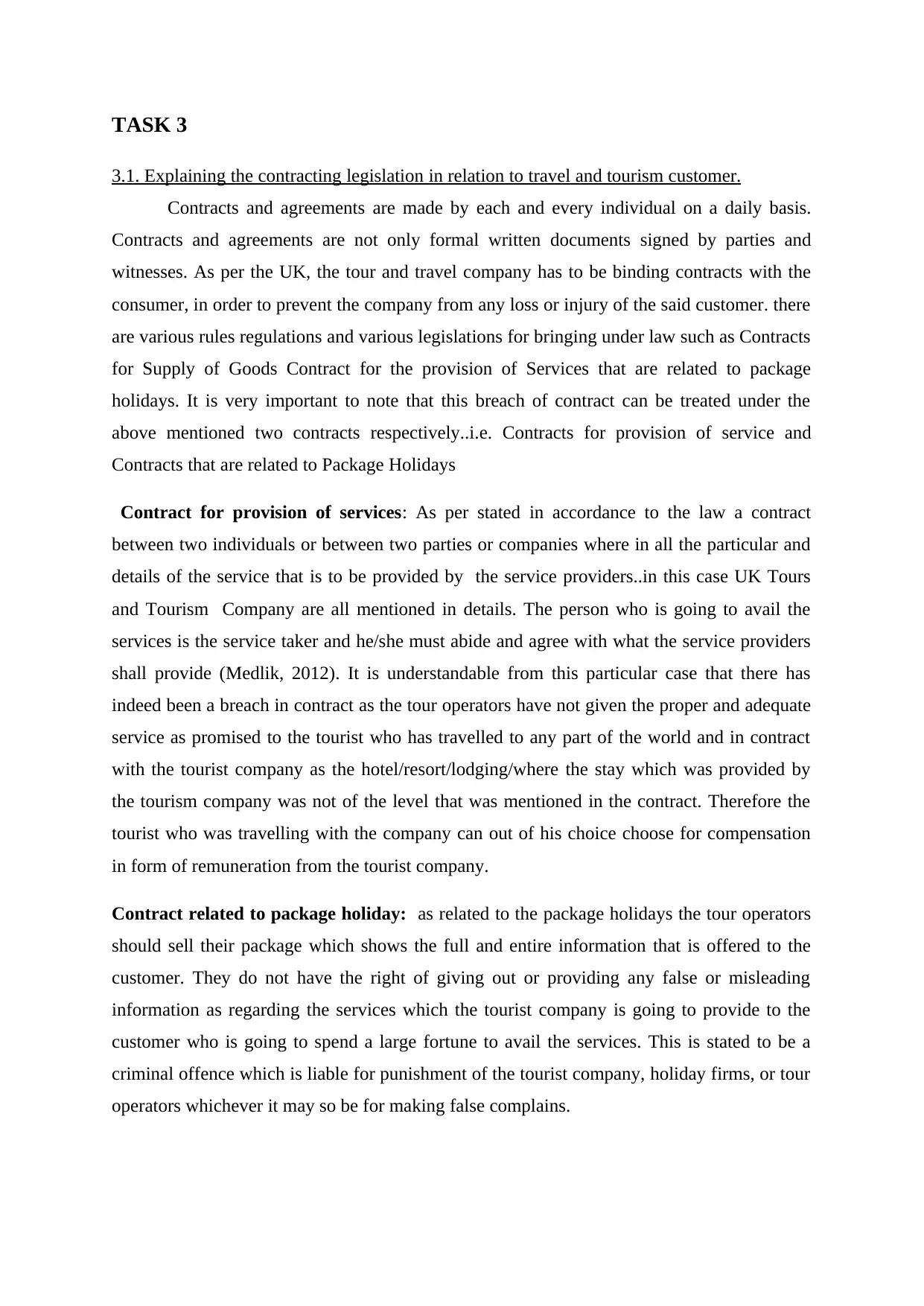
TASK 3
3.1. Explaining the contracting legislation in relation to travel and tourism customer.
Contracts and agreements are made by each and every individual on a daily basis.
Contracts and agreements are not only formal written documents signed by parties and
witnesses. As per the UK, the tour and travel company has to be binding contracts with the
consumer, in order to prevent the company from any loss or injury of the said customer. there
are various rules regulations and various legislations for bringing under law such as Contracts
for Supply of Goods Contract for the provision of Services that are related to package
holidays. It is very important to note that this breach of contract can be treated under the
above mentioned two contracts respectively..i.e. Contracts for provision of service and
Contracts that are related to Package Holidays
Contract for provision of services: As per stated in accordance to the law a contract
between two individuals or between two parties or companies where in all the particular and
details of the service that is to be provided by the service providers..in this case UK Tours
and Tourism Company are all mentioned in details. The person who is going to avail the
services is the service taker and he/she must abide and agree with what the service providers
shall provide (Medlik, 2012). It is understandable from this particular case that there has
indeed been a breach in contract as the tour operators have not given the proper and adequate
service as promised to the tourist who has travelled to any part of the world and in contract
with the tourist company as the hotel/resort/lodging/where the stay which was provided by
the tourism company was not of the level that was mentioned in the contract. Therefore the
tourist who was travelling with the company can out of his choice choose for compensation
in form of remuneration from the tourist company.
Contract related to package holiday: as related to the package holidays the tour operators
should sell their package which shows the full and entire information that is offered to the
customer. They do not have the right of giving out or providing any false or misleading
information as regarding the services which the tourist company is going to provide to the
customer who is going to spend a large fortune to avail the services. This is stated to be a
criminal offence which is liable for punishment of the tourist company, holiday firms, or tour
operators whichever it may so be for making false complains.
3.1. Explaining the contracting legislation in relation to travel and tourism customer.
Contracts and agreements are made by each and every individual on a daily basis.
Contracts and agreements are not only formal written documents signed by parties and
witnesses. As per the UK, the tour and travel company has to be binding contracts with the
consumer, in order to prevent the company from any loss or injury of the said customer. there
are various rules regulations and various legislations for bringing under law such as Contracts
for Supply of Goods Contract for the provision of Services that are related to package
holidays. It is very important to note that this breach of contract can be treated under the
above mentioned two contracts respectively..i.e. Contracts for provision of service and
Contracts that are related to Package Holidays
Contract for provision of services: As per stated in accordance to the law a contract
between two individuals or between two parties or companies where in all the particular and
details of the service that is to be provided by the service providers..in this case UK Tours
and Tourism Company are all mentioned in details. The person who is going to avail the
services is the service taker and he/she must abide and agree with what the service providers
shall provide (Medlik, 2012). It is understandable from this particular case that there has
indeed been a breach in contract as the tour operators have not given the proper and adequate
service as promised to the tourist who has travelled to any part of the world and in contract
with the tourist company as the hotel/resort/lodging/where the stay which was provided by
the tourism company was not of the level that was mentioned in the contract. Therefore the
tourist who was travelling with the company can out of his choice choose for compensation
in form of remuneration from the tourist company.
Contract related to package holiday: as related to the package holidays the tour operators
should sell their package which shows the full and entire information that is offered to the
customer. They do not have the right of giving out or providing any false or misleading
information as regarding the services which the tourist company is going to provide to the
customer who is going to spend a large fortune to avail the services. This is stated to be a
criminal offence which is liable for punishment of the tourist company, holiday firms, or tour
operators whichever it may so be for making false complains.
Paraphrase This Document
Need a fresh take? Get an instant paraphrase of this document with our AI Paraphraser
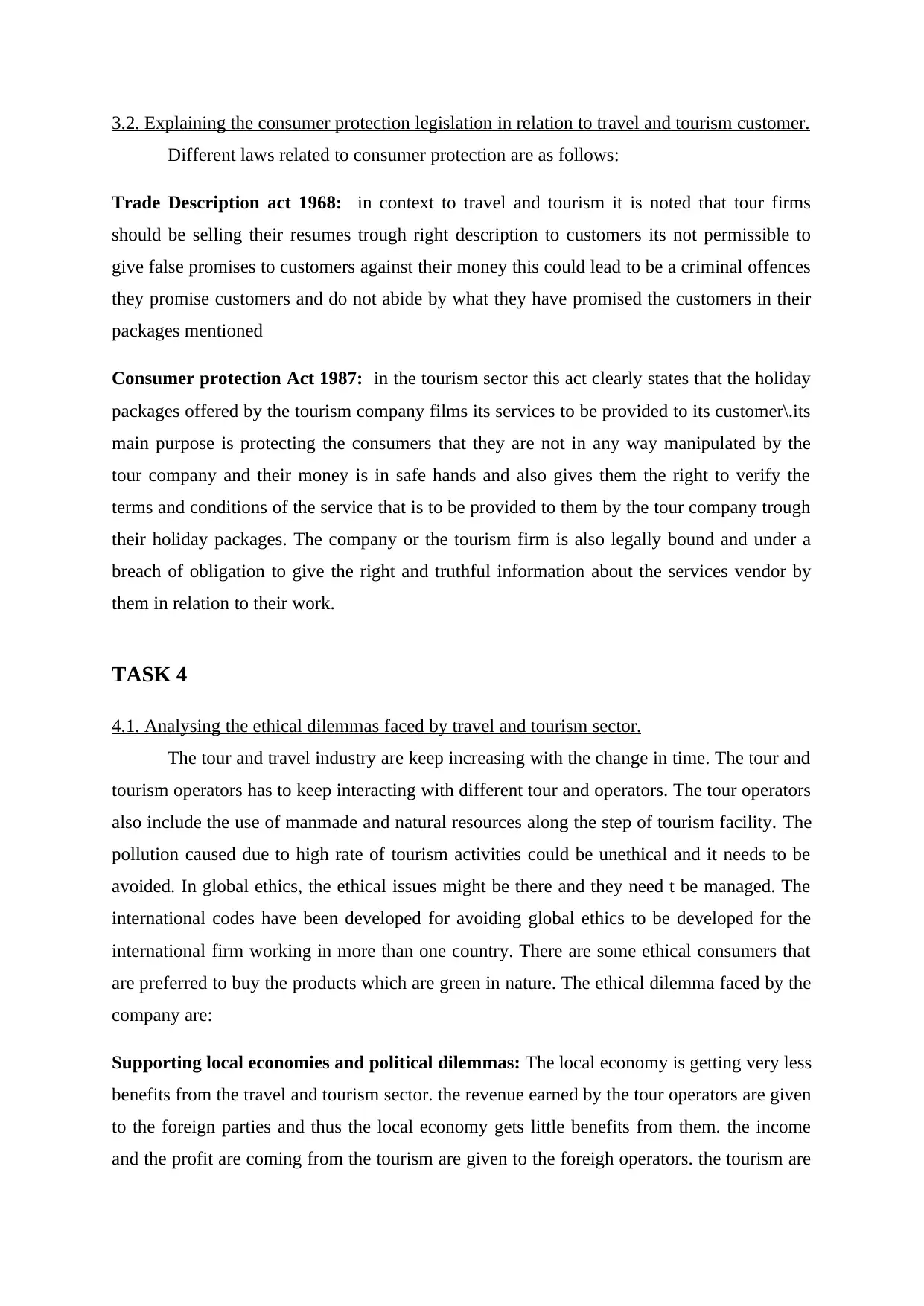
3.2. Explaining the consumer protection legislation in relation to travel and tourism customer.
Different laws related to consumer protection are as follows:
Trade Description act 1968: in context to travel and tourism it is noted that tour firms
should be selling their resumes trough right description to customers its not permissible to
give false promises to customers against their money this could lead to be a criminal offences
they promise customers and do not abide by what they have promised the customers in their
packages mentioned
Consumer protection Act 1987: in the tourism sector this act clearly states that the holiday
packages offered by the tourism company films its services to be provided to its customer\.its
main purpose is protecting the consumers that they are not in any way manipulated by the
tour company and their money is in safe hands and also gives them the right to verify the
terms and conditions of the service that is to be provided to them by the tour company trough
their holiday packages. The company or the tourism firm is also legally bound and under a
breach of obligation to give the right and truthful information about the services vendor by
them in relation to their work.
TASK 4
4.1. Analysing the ethical dilemmas faced by travel and tourism sector.
The tour and travel industry are keep increasing with the change in time. The tour and
tourism operators has to keep interacting with different tour and operators. The tour operators
also include the use of manmade and natural resources along the step of tourism facility. The
pollution caused due to high rate of tourism activities could be unethical and it needs to be
avoided. In global ethics, the ethical issues might be there and they need t be managed. The
international codes have been developed for avoiding global ethics to be developed for the
international firm working in more than one country. There are some ethical consumers that
are preferred to buy the products which are green in nature. The ethical dilemma faced by the
company are:
Supporting local economies and political dilemmas: The local economy is getting very less
benefits from the travel and tourism sector. the revenue earned by the tour operators are given
to the foreign parties and thus the local economy gets little benefits from them. the income
and the profit are coming from the tourism are given to the foreigh operators. the tourism are
Different laws related to consumer protection are as follows:
Trade Description act 1968: in context to travel and tourism it is noted that tour firms
should be selling their resumes trough right description to customers its not permissible to
give false promises to customers against their money this could lead to be a criminal offences
they promise customers and do not abide by what they have promised the customers in their
packages mentioned
Consumer protection Act 1987: in the tourism sector this act clearly states that the holiday
packages offered by the tourism company films its services to be provided to its customer\.its
main purpose is protecting the consumers that they are not in any way manipulated by the
tour company and their money is in safe hands and also gives them the right to verify the
terms and conditions of the service that is to be provided to them by the tour company trough
their holiday packages. The company or the tourism firm is also legally bound and under a
breach of obligation to give the right and truthful information about the services vendor by
them in relation to their work.
TASK 4
4.1. Analysing the ethical dilemmas faced by travel and tourism sector.
The tour and travel industry are keep increasing with the change in time. The tour and
tourism operators has to keep interacting with different tour and operators. The tour operators
also include the use of manmade and natural resources along the step of tourism facility. The
pollution caused due to high rate of tourism activities could be unethical and it needs to be
avoided. In global ethics, the ethical issues might be there and they need t be managed. The
international codes have been developed for avoiding global ethics to be developed for the
international firm working in more than one country. There are some ethical consumers that
are preferred to buy the products which are green in nature. The ethical dilemma faced by the
company are:
Supporting local economies and political dilemmas: The local economy is getting very less
benefits from the travel and tourism sector. the revenue earned by the tour operators are given
to the foreign parties and thus the local economy gets little benefits from them. the income
and the profit are coming from the tourism are given to the foreigh operators. the tourism are
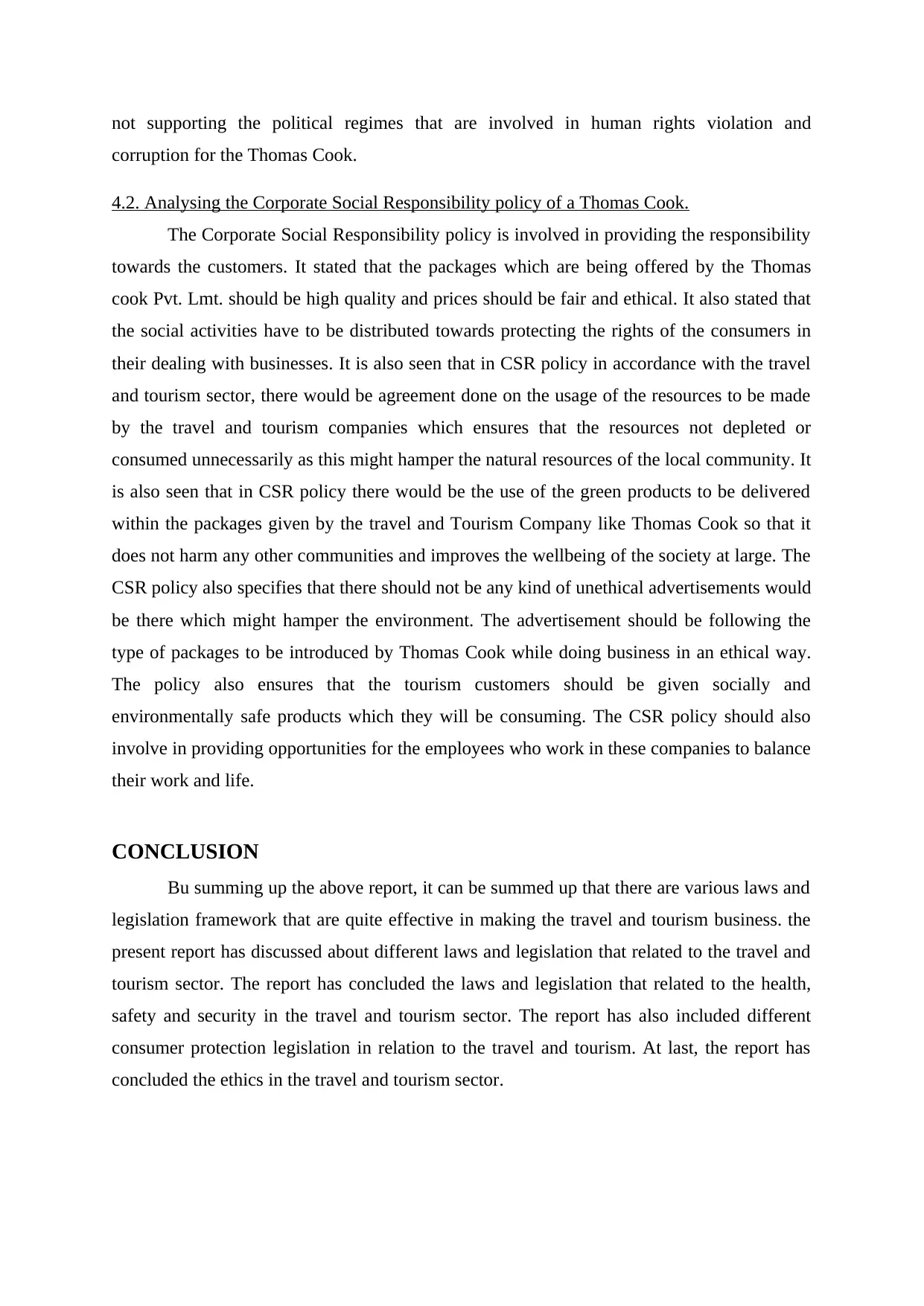
not supporting the political regimes that are involved in human rights violation and
corruption for the Thomas Cook.
4.2. Analysing the Corporate Social Responsibility policy of a Thomas Cook.
The Corporate Social Responsibility policy is involved in providing the responsibility
towards the customers. It stated that the packages which are being offered by the Thomas
cook Pvt. Lmt. should be high quality and prices should be fair and ethical. It also stated that
the social activities have to be distributed towards protecting the rights of the consumers in
their dealing with businesses. It is also seen that in CSR policy in accordance with the travel
and tourism sector, there would be agreement done on the usage of the resources to be made
by the travel and tourism companies which ensures that the resources not depleted or
consumed unnecessarily as this might hamper the natural resources of the local community. It
is also seen that in CSR policy there would be the use of the green products to be delivered
within the packages given by the travel and Tourism Company like Thomas Cook so that it
does not harm any other communities and improves the wellbeing of the society at large. The
CSR policy also specifies that there should not be any kind of unethical advertisements would
be there which might hamper the environment. The advertisement should be following the
type of packages to be introduced by Thomas Cook while doing business in an ethical way.
The policy also ensures that the tourism customers should be given socially and
environmentally safe products which they will be consuming. The CSR policy should also
involve in providing opportunities for the employees who work in these companies to balance
their work and life.
CONCLUSION
Bu summing up the above report, it can be summed up that there are various laws and
legislation framework that are quite effective in making the travel and tourism business. the
present report has discussed about different laws and legislation that related to the travel and
tourism sector. The report has concluded the laws and legislation that related to the health,
safety and security in the travel and tourism sector. The report has also included different
consumer protection legislation in relation to the travel and tourism. At last, the report has
concluded the ethics in the travel and tourism sector.
corruption for the Thomas Cook.
4.2. Analysing the Corporate Social Responsibility policy of a Thomas Cook.
The Corporate Social Responsibility policy is involved in providing the responsibility
towards the customers. It stated that the packages which are being offered by the Thomas
cook Pvt. Lmt. should be high quality and prices should be fair and ethical. It also stated that
the social activities have to be distributed towards protecting the rights of the consumers in
their dealing with businesses. It is also seen that in CSR policy in accordance with the travel
and tourism sector, there would be agreement done on the usage of the resources to be made
by the travel and tourism companies which ensures that the resources not depleted or
consumed unnecessarily as this might hamper the natural resources of the local community. It
is also seen that in CSR policy there would be the use of the green products to be delivered
within the packages given by the travel and Tourism Company like Thomas Cook so that it
does not harm any other communities and improves the wellbeing of the society at large. The
CSR policy also specifies that there should not be any kind of unethical advertisements would
be there which might hamper the environment. The advertisement should be following the
type of packages to be introduced by Thomas Cook while doing business in an ethical way.
The policy also ensures that the tourism customers should be given socially and
environmentally safe products which they will be consuming. The CSR policy should also
involve in providing opportunities for the employees who work in these companies to balance
their work and life.
CONCLUSION
Bu summing up the above report, it can be summed up that there are various laws and
legislation framework that are quite effective in making the travel and tourism business. the
present report has discussed about different laws and legislation that related to the travel and
tourism sector. The report has concluded the laws and legislation that related to the health,
safety and security in the travel and tourism sector. The report has also included different
consumer protection legislation in relation to the travel and tourism. At last, the report has
concluded the ethics in the travel and tourism sector.
⊘ This is a preview!⊘
Do you want full access?
Subscribe today to unlock all pages.

Trusted by 1+ million students worldwide
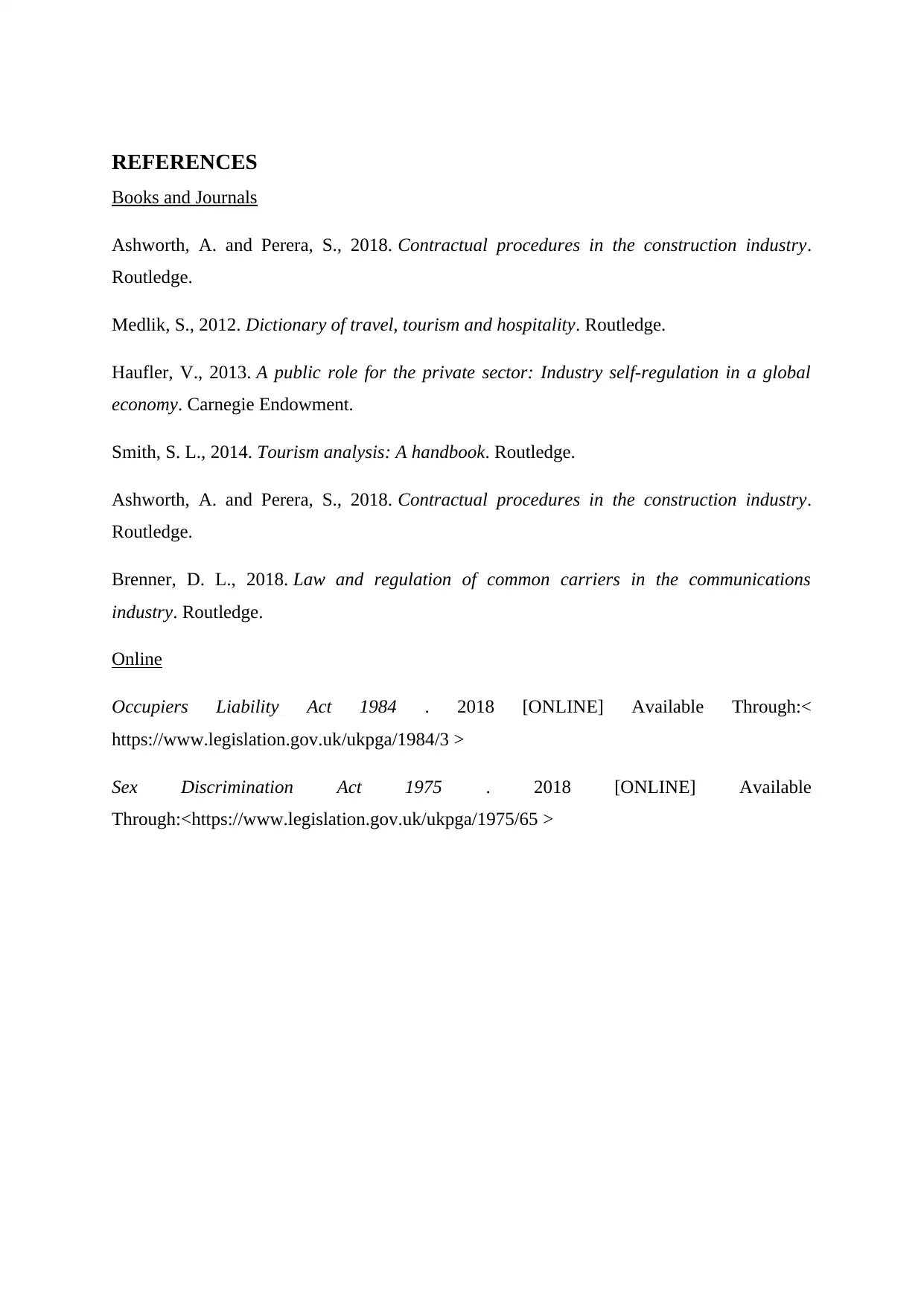
REFERENCES
Books and Journals
Ashworth, A. and Perera, S., 2018. Contractual procedures in the construction industry.
Routledge.
Medlik, S., 2012. Dictionary of travel, tourism and hospitality. Routledge.
Haufler, V., 2013. A public role for the private sector: Industry self-regulation in a global
economy. Carnegie Endowment.
Smith, S. L., 2014. Tourism analysis: A handbook. Routledge.
Ashworth, A. and Perera, S., 2018. Contractual procedures in the construction industry.
Routledge.
Brenner, D. L., 2018. Law and regulation of common carriers in the communications
industry. Routledge.
Online
Occupiers Liability Act 1984 . 2018 [ONLINE] Available Through:<
https://www.legislation.gov.uk/ukpga/1984/3 >
Sex Discrimination Act 1975 . 2018 [ONLINE] Available
Through:<https://www.legislation.gov.uk/ukpga/1975/65 >
Books and Journals
Ashworth, A. and Perera, S., 2018. Contractual procedures in the construction industry.
Routledge.
Medlik, S., 2012. Dictionary of travel, tourism and hospitality. Routledge.
Haufler, V., 2013. A public role for the private sector: Industry self-regulation in a global
economy. Carnegie Endowment.
Smith, S. L., 2014. Tourism analysis: A handbook. Routledge.
Ashworth, A. and Perera, S., 2018. Contractual procedures in the construction industry.
Routledge.
Brenner, D. L., 2018. Law and regulation of common carriers in the communications
industry. Routledge.
Online
Occupiers Liability Act 1984 . 2018 [ONLINE] Available Through:<
https://www.legislation.gov.uk/ukpga/1984/3 >
Sex Discrimination Act 1975 . 2018 [ONLINE] Available
Through:<https://www.legislation.gov.uk/ukpga/1975/65 >
1 out of 10
Related Documents
Your All-in-One AI-Powered Toolkit for Academic Success.
+13062052269
info@desklib.com
Available 24*7 on WhatsApp / Email
![[object Object]](/_next/static/media/star-bottom.7253800d.svg)
Unlock your academic potential
Copyright © 2020–2026 A2Z Services. All Rights Reserved. Developed and managed by ZUCOL.



